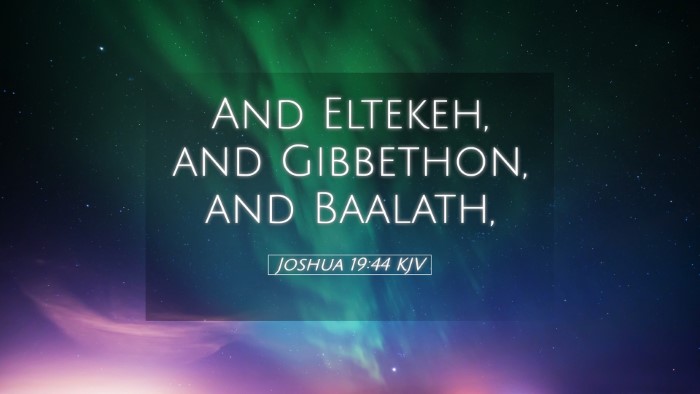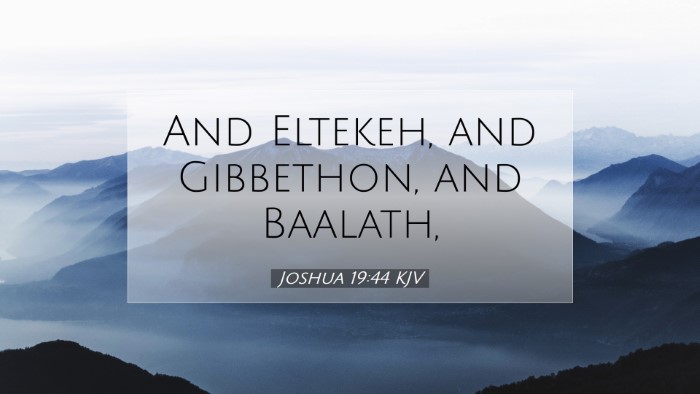Commentary on Joshua 19:44
Bible Verse: "And Eltekon, and Gibbethon, and Baalath," (Joshua 19:44)
Overview
The verse under consideration, Joshua 19:44, is a part of the portion of Scripture that details the division of the land among the tribes of Israel. Eltekon, Gibbethon, and Baalath are mentioned as cities or regions assigned to the tribe of Dan. Understanding these names and their implications requires careful examination of the historical and theological context.
Insights from Public Domain Commentaries
Matthew Henry's Commentary
Matthew Henry draws attention to the precise nature of the allotment and the significance of each city named in this verse. He notes that the careful listing of towns serves to document the fulfillment of God's promise to the Israelites.
- Historical Context: Eltekon is referred to as a lesser-known city, highlighting the importance of all settlements in the fulfillment of God's design for the people of Israel.
- Symbolic Representation: Each city mentioned symbolizes the broader scope of God’s faithfulness in providing land to the tribes. This reminds readers of God’s commitment to His covenant with Abraham.
- Implication for the Tribe of Dan: Henry emphasizes that the allotment reflects not just a geographical distribution, but the spiritual inheritance tied to the land, which carries implications for identity and worship among the tribes.
Albert Barnes' Commentary
Albert Barnes provides a detailed analysis of the geographical significance of the cities mentioned. His commentary suggests that Gibbethon, notably, was a Levitical city, which underlines the integration of sacred spaces into everyday life for the tribes.
- Geographical Significance: Barnes points out the strategic placement of these cities and how they served to guard the varied entrances into Israel's territories, thereby being important for both trade and military defense.
- Religious Meaning: The mention of Baalath, a name associated with idol worship, indicates the challenges the Israelites would face regarding fidelity to God, setting the stage for the later historical conflicts depicted in the books of Kings.
- Application for Modern Believers: Barnes stresses the understanding that believers today are called to be conscious of where they dwell spiritually and to maintain a faithful witness, as those in the Old Testament were expected to do.
Adam Clarke's Commentary
Adam Clarke approaches the text with a linguist's eye, delving into the etymology of the names Eltekon, Gibbethon, and Baalath, emphasizing their meanings and significance.
- Meaning of Names: Clarke explains that Eltekon may refer to “God has made,” suggesting a divine purpose. Gibbethon can mean “hill,” depicting a natural fortress, while Baalath reflects the ongoing struggle with idolatry.
- Theological Implications: The naming reflects God's sovereignty in mapping out the elements of life for the Israelites—redeeming them from slavery yet guiding them into challenges of faithfulness and worship.
- Encouragement for Spiritual Growth: Clarke concludes that the careful recording of these cities encourages believers to seek understanding of their spiritual heritage and to examine their paths as directed by God.
Theological Themes
Across the various commentaries, several theological themes emerge from Joshua 19:44:
- Faithfulness of God: The reaffirmation of God's promises stands central to the narrative, providing reassurance to believers of His unwavering faithfulness.
- Identity and Heritage: The allotment of land signifies identity for the tribes. Today, Christians are encouraged to consider their identity rooted in Christ as they reflect on the importance of scriptural heritage.
- Challenges of Idolatry: Even as the Israelites entered a promised land, the continued mention of Baalath serves as a warning about turning away from God—an issue that remains pertinent in contemporary faith practice.
Conclusion
Joshua 19:44 offers profound insights into the nature of God’s covenant with His people and the importance of adhering to Him amidst the complexities of daily life. As seen through the lenses of respected biblical scholars, the verse serves as a reminder of both the blessings and responsibilities that come with God’s gifts—an enduring message for pastors, students, theologians, and scholars alike.


